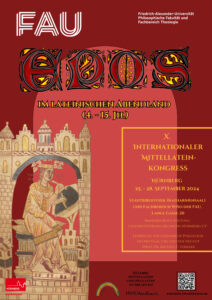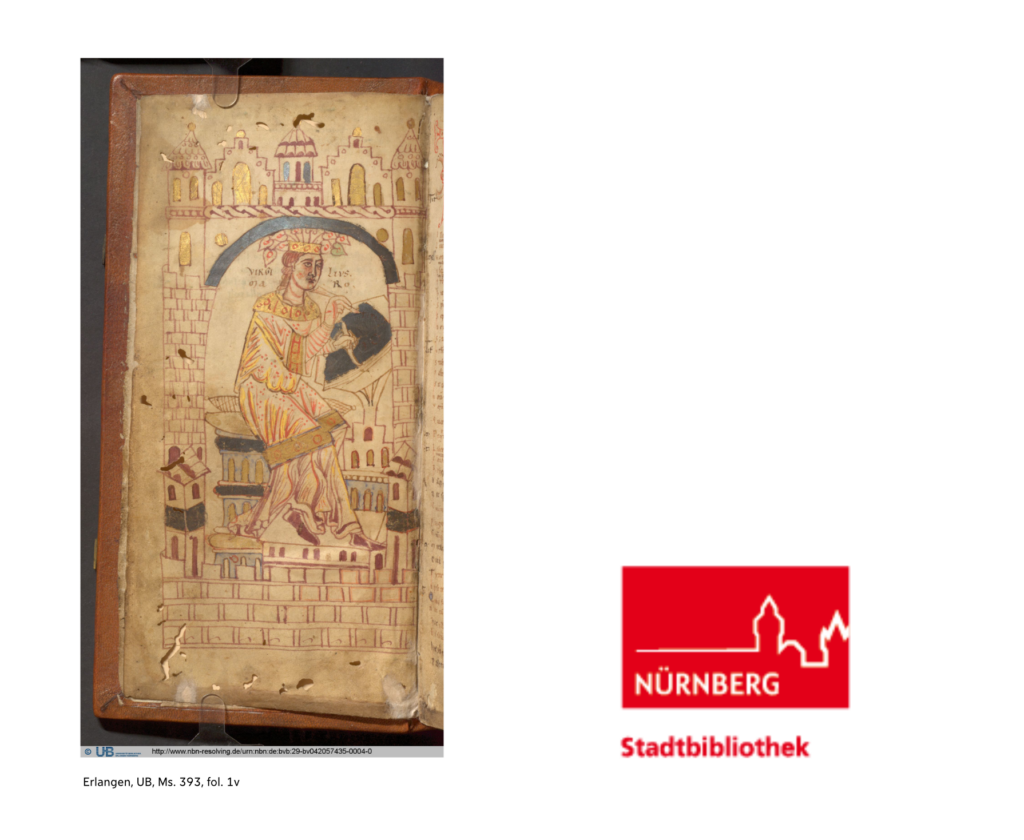Epos 2024

The epic in the Latin Occident (4th to 15th century)
Tenth International Medieval Latin Congress, Nuremberg, City Library (Katharinensaal) and Department of Economics and Social Sciences at FAU, Lange Gasse 20
Wednesday, September 25 to Saturday, September 28, 2024
Tradition and topicality of a theme
Stories of heroic deeds, crimes and personal and collective tragedies have become sadly topical since the resurgence of war in Europe. The International Congress in Nuremberg was focused on the genre that for many centuries turned such stories into literature, the Latin epic in Late Antiquity, the Middle Ages and the Renaissance. What was the content of epics? Not just the glorification of admirable figures from myth and history in euphonious verse, often following ancient authors such as Virgil, who continued to be widely read, commented on and translated. The epics often offered a critical examination of the heroes and their adversaries, which appeals to us because they question the martial aspect as a value and a means. The epic was also used for religious and educational purposes.
International speakers
The International Medieval Latin Congress was returning to Germany for the first time since 1988 after stops in Florence, Toronto, Vienna and Prague, among other places. Top researchers from Europe and overseas (Canada, USA) appeared in Nuremberg and presented the results of their work for discussion.
Scholarships were offered for younger researchers.
 Programmkomitee
Programmkomitee
Prof. Dr. Michele C. Ferrrari (Erlangen),Chairman
Prof. Dr. Peter Orth (Cologne)
Akad. Dir. Dr. Stefan Weber (Erlangen)
Christian Schmidt, contact person and congress manager
Organizer
Chair of Latin Philology of the Middle Ages and Modern Times (Prof. Dr. Michele C Ferrari) at the FAU Erlangen-Nuremberg
Co-organizer: City of Nuremberg, Nuremberg City Library
Sponsorship
The conference was sponsored by the Manfred Roth Stiftung and the Universitätsbund.
The conference was also supported by the FAU Nuremberg-Erlangen, the Luise Prell Stiftung, the Evangelical Reformed Church of St. Martha, the Staatsbibliothek Bamberg and HWB Mittellatein.
Conference Agenda
10th International Conference of Medieval Latin: Epic in the Latin West (4th – 15th Centuries)
Below you will find an overview of the planned programme. Download the presented programme here.
| Date: Wednesday, 25/Sept/2024 | ||||
| 9:30am – 11:30am |
Opening Ceremony: Opening of the 10th International Congress of Medieval Latin and anniversary celebration of 60 years of Medieval Latin in Erlangen Location: Katharinensaal |
|||
| 2:30pm – 3:30pm |
Section 01: Late Antique Pagan and Biblical Poetry Location: Hörsaal 5 |
Section 02: Late Antique Biblical Poetry and Epic 1 Location: Hörsaal 6 |
Section 03: The Epic in the Digital Age Location: Seminar Room 0.424 |
Section 04: Traces of Germanic Epics Location: Katharinensaal |
| 4:00pm – 5:30pm |
Section 05: Poetic Narratives of Ottoman Expansion (15th/16th Centuries) Location: Hörsaal 5 |
Section 06: Late Antique Biblical Poetry and Epic 2 Location: Hörsaal 6 |
Section 07: Lucan in the Early Middle Ages: Text and Reception Location: Seminar Room 0.424 |
Section 08: The City in Poetry: Foundation, Existence, Decline Location: Katharinensaal |
| 5:45pm – 6:45pm |
Section 09: The Epic in the Middle Ages: Theory and Discourse Location: Hörsaal 5 |
|||
| Date: Thursday, 26/Sept/2024 | ||||
| 9:00am – 10:00am |
Keynote I: Schubert, Gott als Held in der spätantiken Bibeldichtung Location: Hörsaal 5 |
|||
| 10:00am – 11:00am |
Keynote II: Stella, Early Medieval Epic Location: Hörsaal 5 |
|||
| 11:30am – 12:30pm |
Keynote III: Orth, Von Heiligen und Helden. (Un)Konventionelle Annäherungen an episches Dichten vom 9. bis zum 11. Jahrhundert Location: Hörsaal 5 |
|||
| 2:30pm – 3:30pm |
Section 10: The Epic between Parody and réécriture Location: Hörsaal 5 |
Section 11: Epic and the Reception of Vergil Location: Hörsaal 6 |
Section 12: The Epic at the Papal Court Location: Seminar Room 0.424 |
Section 13: Epic and Intellectual Culture 1 Location: Katharinensaal |
| 4:00pm – 5:30pm |
Section 14: Epic for the Carolingian Dynasty Location: Hörsaal 5 |
Section 15: Heroes and Saints Location: Hörsaal 6 |
Section 16: Monastic Culture and Epic Poetry 1 Location: Seminar Room 0.424 |
Section 17: Epic and Intellectual Culture 2 Location: Katharinensaal |
| 5:45pm – 6:45pm |
Additional Program: Presentation of current projects Location: Hörsaal 5 |
|||
| Date: Friday, 27/Sept/2024 | ||||
| 9:00am – 10:00am |
Keynote IV: Kretschmer, Latin Epic Poetry of the Twelfth Century Location: Hörsaal 5 |
|||
| 10:00am – 11:00am |
Keynote V: Dinkova-Bruun, Biblical Epic of the Later Middle Ages Location: Hörsaal 5 |
|||
| 11:30am – 12:30pm |
Keynote VI: Haye, Spätmittelalterliche Epik im nordalpinen Raum. Defizit oder perspektivische Verzerrung? Location: Hörsaal 5 |
|||
| 2:30pm – 3:30pm |
Section 18: Panegyric and Contemporary History in the Renaissance Epic 1 Location: Hörsaal 5 |
Section 19: Panegyric and Contemporary History in the Renaissance Epic 2 Location: Hörsaal 6 |
Section 20: Petrarch and his Time Location: Seminar Room 0.424 |
Section 21: The Epic in Christian Humanism Location: Katharinensaal |
| 4:00pm – 5:30pm |
Section 22: The World of Knights and Courtiers: Myth and History Location: Hörsaal 5 |
Section 23: Walter of Châtillon and the European Epic in the 12th and 13th Centuries Location: Hörsaal 6 |
Section 24: Monastic Culture and Epic Poetry 2 Location: Seminar Room 0.424 |
Section 25: The Medieval Biblical Epic Location: Katharinensaal |
| 5:40pm – 6:25pm |
General Assembly of Medieval Latinists Location: Hörsaal 5To the general Assembly all visitors of the conference are invited. General questions and the possibility and subject of further meetings will be discussed. |
|||
| 7:00pm – 8:30pm |
Konzert anDante: Concert with Vocal Ensemble anDante Location: St Martha’s ChurchEntrance is free of charge for registered participants, but donations für St Martha’s church are requested. Please check before the event whether any changes have been made to the time or location. |
|||
| Date: Saturday, 28/Sept/2024 | ||
| 9:00am – 10:00am |
Keynote VII: Ferrari, Zwischen Karthago und Padua. Das italienische Epos im 13. und 14. Jahrhundert Location: Hörsaal 5 |
|
| 10:00am – 11:00am |
Keynote VIII: Huber-Rebenich,Ovids Metamorphosen. Das Fortleben eines „Epos sui generis“ in Text und Bild Location: Hörsaal 5 |
|
| 11:30am – 12:30pm |
Keynote IX: Glei, Jerusalem und Konstantinopel. Epik an der Zeitenwende Location: Hörsaal 5 |
|
| 12:30pm – 1:00pm |
Farewell Ceremony Location: Hörsaal 5 Chair: Prof. Michele C. Ferrari, FAU Erlangen-Nürnberg |
|
In 2024, our chair celebrated its 60th anniversary, as Franz Brunhölzl was appointed associate professor and head of the newly established Department of Medieval Latin Philology in January 1964. This anniversary was celebrated during the Tenth International Medieval Latin Congress „The Epic in the Latin Occident (4th to 15th century)“. Further information on our history can be found here: https://www.mittellatein.phil.fau.de/lehrstuhl/archiv/
We’re looking forward to meet you again at the 11th International Medieval Latin Congress on “Apocalypse”, which will take place in Oviedo from September 1 to 4, 2027.
